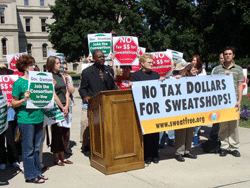
More than 40 people gathered on the Michigan State Capitol’s south lawn in Lansing on Tuesday, July 1, to rally against the state’s purchasing of employee uniforms through companies that use sweatshop labor practices.
The rally, attended by members of various social and religious groups as well as students, coincided with the release of a new report by the SweatFree organization entitled Subsidizing Sweatshops, a 52-page offering that outlines what people can do to stop their governments from “using our tax dollars to fund the race to the bottom.”
The report is meant to be shared with the public, elected officials, and companies as a means to educate them about the injustices workers face at sweatshops for American companies. It documents in-depth case studies of 12 factories in nine different countries that produce work uniforms for firefighters, police officers, and parks service employees. Rights violations cited include findings of children working under the legal minimum age limit, wages below the minimum level, forced overtime shifts, excessively long work hours, verbal, physical, and sexual abuse, and no freedom of speech or rights to organize into unions.
In the case of Michigan, three of the companies named in the report supply state employees with uniforms: Lion Apparel, Dickies and Fechheimer.
“We’re inviting Governor Jennifer Granholm to join the SweatFree consortion and asking local and state governments to pool their resources to enforce human rights standards and to create a market for sweat-free goods,” said Victoria Kaplan, Midwest Regional Organizer for SweatFree Communities.
The nine countries named in the report where labor violations are reportedly taking place are Pakistan, China, Bangladesh, Honduras, Dominican Republic, the United States, Cambodia, Nicaragua and Mexico. But Kaplan also said that Arabs should be concerned about the problem as well because it is a world-wide issue.
“Sweatshops exist all over the world,” she said. “We have seen reports of abusive conditions in factories in the Middle East, just the same as we’ve seen in other countries as well. So this should be a concern for anybody who cares about alleviating poverty in the world.”
Research conducted by SweatFree’s partner organization in Bangladesh even indicated that some garment workers are required to work 14 or 15 hour days during the holy month of Ramadan, when Muslim workers fast during the day, and wages are deducted for namaz (praying).
One of the most important steps towards improving conditions at the factories that produce state uniforms will be to get other states to sign on and join forces in order to work with the companies.
Even though it might take a little while to get other states on board, Kaplan is confident that Michigan will be one of the states taking the lead in the fight to improve conditions at factories where state uniforms are produced.
“We look forward to working with Granholm’s administration to join the SweatFree consortion and to implement policy changes. We’ve already met with them and feel like we will get them to make some changes,” said Kaplan.
The SweatFree campaign is a coalition of human rights organizations including student, labor, and religious groups as well as businesses. Kaplan encouraged other organizations to join in order to help the campaign build up a strong base. Organizations or individuals who want to help can contact the campaign at www.sweatfree.org/endorse. To view the Subsidizing Sweatshops report and its case studies on violations at factories, go to www.sweatfree.org/subsidizing.






Leave a Reply